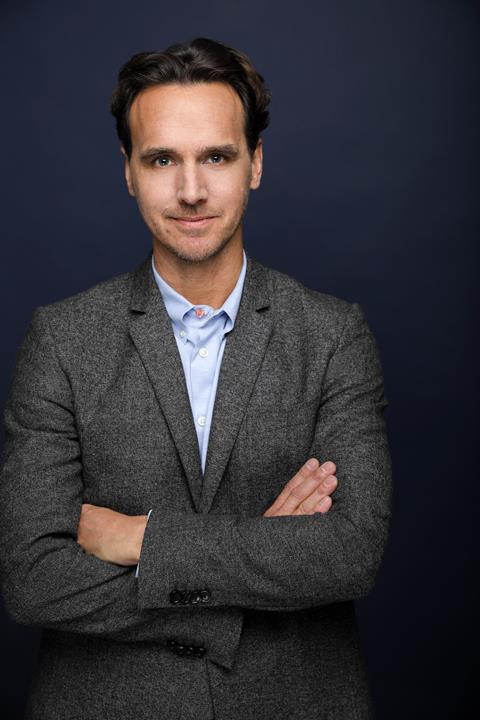Fox Entertainment’s British unscripted programming chief on spotting hit entertainment formats and building a career in the US
Rob Wade was destined to end up in the US. From the age of 15, the president of alternative entertainment and specials at Fox Entertainment had been “dying to get out of England”.
Camping holidays in France, a school rugby trip and studying Italian at university fuelled his international outlook and by the time he began his career in TV, Wade admits he had “started taking any job I could find that would get me out of the country”.

He is talking to Broadcast from a gloriously sunny LA as London experiences yet another gloomy winter evening, suggesting he made the right choice. “I have three very bouncy kids, two dogs, three budgies and seven fish over here,” he says.
“It’s a full life. My wife keeps me on my toes and I have a strong and close group of friends with whom I came to the US 15 years ago. My cup overfloweth.”
Professionally, Wade isn’t facing a glass-half-empty situation either. Although the interview was conducted before coronavirus brought production to a halt across the globe, the Fox broadcast network, which was not part of the Disney asset sale and is instead owned by the Murdoch family-controlled Fox Corp, has enjoyed a series of ratings smashes over the past 18 months.
Music competition The Four: Battle For Stardom, based on an Armoza format, became Fox’s highest-rated new unscripted series in nearly four years when it landed in 2018, but it was merely the warm-up act to Wade’s star turn when he ordered The Masked Singer – based on Korean format King Of Masked Singer – the same year.
Much like in the UK, where Bandicoot picked up the rights on a punt, in the US the show had been optioned opportunistically by Minute To Win It creator Craig Plestis and his Smart Dog Media indie. The show launched in January last year with an overnight rating of 9.4 million, making it Fox’s best debut of 2019.
“When I first got to the US, it was like climbing an ice wall – I felt I needed one foothold to get going, and then I could start to build from there. The Four was that foothold”
Complementing the show on Wade’s slate are long-running reality competition So You Think You Can Dance, a remake of Channel 4’s dating format Flirty Dancing, Jamie Foxx-fronted music competition Beat Shazam and another new breakout hit, Lego Masters, co-produced by UK indie Tuesday’s Child, which created the format for C4.
Gaining a foothold
“When I first got here, it was like climbing an ice wall – I felt I needed one foothold to get going, and then I could start to build from there,” says Wade. “The Four was that foothold. It allowed me to pull myself up and make another smash in The Masked Singer.”
Lego Masters has been the revelation of 2020, becoming Fox’s best-performing launch of the past 12 months when it debuted to 4.8 million viewers in February.

It hasn’t gone unnoticed. One creative exec at a leading super-indie recently told Broadcast that if Wade “doesn’t hear from the palace about some sort of New Year’s Honour for launching this show so successfully, then I’m going to get a petition up”.
Wade placed Lego Masters in a 9pm Wednesday slot, directly after The Masked Singer. Despite strong inheritance from its predecessor, a family-skewed show about building with toy bricks constituted a risk at the heart of primetime.
“I had a similar feeling as I did with The Masked Singer, which was that we’d done a good job in programming it,” he says. “If it didn’t work, it was going to be a real head spin.”
To onlookers, Wade may appear to have a Midas touch in an age where audiences are deserting broadcast networks for streamers. However, the exec, who took up his role after a spell as showrunner on ABC’s Dancing With The Stars (Strictly Come Dancing in the UK), feels Fox’s unscripted strategy still has a way to go.
He acknowledges an attempted remake of Tinopolis dating format Paradise Hotel was a misfire – something more suited to “the old Fox; the ‘shock Fox’”. And he is still “figuring out” how to make First Responders Live – the channel’s first foray into the live genre – a success.
He also shows a hint of frustration that Fox has become associated with format acquisitions over originals. Wade says that “a lot of consideration” goes into buying third-party formats and stresses each decision has an impact on budgets and schedules.

A key shift in strategy was the launch of Fox Alternative Entertainment (FAE) – a studio set up to create and control the channel’s unscripted IP. Wade sees this as crucial to the long-term success of ‘New Fox’ – as it is colloquially known in the US.
“While we’ve been buying these formats and setting up the network, we’ve been looking three or four years into the future,” he says. “One thing we’ve identified, and it’s not rocket science, is the need for IP ownership. We need to look at how our schedule is made up and how our amazing shop window is used, not just to see a good overnight rating, but to provide long-term value.”
Among FAE’s first projects was The Masked Singer series two at the back end of 2019. Endemol Shine North America, a co-producer on series one through its overall deal with Plestis, has exited the show. However, Plestis remains an executive producer and Endemol Shine will continue to produce other versions, such as NTV’s Russian remake.
FAE is lining up another South Korean singing format – I Can See Your Voice – with Plestis once again involved. A Masked Singer spin-off, The Masked Dancer, is also being readied.

Wade wants FAE to act as a “production services hub” where producers from across the globe can directly bring original ideas and “have an access point to make them”. This allows the unit to buy formats and “cut out the middleman”, he says.
“It’s about taking control of our own destiny,” he explains, pointing to spiralling costs in US unscripted as a “massive” challenge. “You look at the profit and loss for a show and what you get for advertising, and the two aren’t matching up. With FAE, we can control margins and spend. It’s a model that the big production companies and studios have been doing for years.”
UK imports
During his time in the US working at the likes of Syco Entertainment and BBC Studios (then BBC Worldwide), Wade has worked on several US adaptations of UK properties, including Dancing With The Stars, America’s Got Talent and The X Factor.
He does not, however, treat his homeland as a consistent conveyor belt of entertainment hits. “We’ve had varying degrees of success with each show from the UK,” he says.
Wade says the BBC and ITV are commissioning fewer shows with international potential. Fifteen years ago, ITV was “the creator of the biggest formats in the world”, he states, but the pipeline “has definitely dried up a bit”.
“The biggest mistake Brits make coming over here is to try to turn the country into Britain. They think because we speak the same language, we’re the same. We’re not”
Wade has had a significant impact on US broadcasting, just like several of his predecessors and mentors, including the late Richard Hopkins, former creative head of format entertainment at the BBC; Sony Pictures Television international chief Wayne Garvie; and NBC Universal chairman Paul Telegdy.
And the reason? He has embraced the American way. “The biggest mistake Brits make coming over here is to try to turn the country into Britain,” he says. “They think that because we speak the same language, we’re the same. We’re not.”

































No comments yet